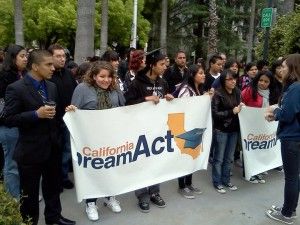Illegals Could Enjoy In-State Tuition
By KATY GRIMES
Should illegal immigrants be allowed to access California’s higher education system at the same tuition rate as students who are legal residents of the state? That question was legislatively answered last week when the Assembly passed a bill that moved illegal immigrant students to the head of the college tuition line, and allowed them to hold student government office.
Authored by Assemblyman Ricardo Lara, D-Artesia, AB 844 would allow “nonimmigrant aliens” access to the same in-state college tuition, grants and scholarships as legal residents of the state.
Doing so would allow them to pay considerably less than legal students from other U.S. states, such as Oregon and Nevada, going to the same California state-run universities and colleges. AB 844 would be mandatory for the California State University and community college systems. But it also ads this clause, italics in the original: “The University of California would be requested to comply with this provision.” So U.C. compliance apparently would be voluntary — for now.
“Unlawful immigrants,” “undocumented immigrants,” “nonimmigrant aliens” or” illegal aliens” — however one chooses to describe people who reside in California illegally, the message is the same: Now even students who cannot provide proof of legal immigration or legal residence will be able to pay the same Cal State University and Community College tuition costs, and receive the same Cal Grants and scholarships as the children of California’s legal residents. Students from other states will still be forced to pay the out-of-state-tuition for the CSU and Community College schools.
But some wonder why the push continues for in-state tuition for illegal immigrant students. The claim that many illegal immigrants pay the higher out-of-state tuition on California state college campuses is shaky. The vast number of programs that CSU colleges have created make it nearly seamless for Hispanic students who apply for college — regardless of legal status.
CSU Promotions
The CSU system boldly promotes Hispanic educational opportunities at its campuses:
The California State University is the university of choice for Hispanics. The CSU system is the largest system in the country, with 23 campuses and seven off-campus centers. Today, 23.8 percent of CSU students are Hispanic, 14 percent of the CSU staff is Hispanic, 8.2 percent of the CSU full-time faculty is Hispanic and 17 CSU campuses are listed in Hispanic Outlook in Higher Education’s annual “Top 100.”
Lara’s bill AB 844 is just one of the bills making this possible. There are numerous bills currently in the legislature granting in-state college tuition for illegal immigrants. AB 844 reads:
This bill would add a provision to the Donahoe Higher Education Act that would provide that any student, including a person without lawful immigration status, or a person who is exempt from nonresident tuition, as described above, may serve in any capacity in student government at the California State University or the California Community Colleges and receive any grant, scholarship, fee waiver, or reimbursement for expenses that is connected with that service to the full extent consistent with federal law. The University of California would be requested to comply with this provision.
Created by the University of California Regents in 1960, the Donahoe Higher Education Act stated that the top 12.5 pecent of graduating high school seniors would be guaranteed a place at one of the U.C. campuses, the top third would be able to enter the California State University and Community Colleges would accept all applicants.
How the standards have changed. These percentages are now calculated using sliding scales for grade-point averages. And scores on the SAT Reasoning Test or ACT are recalculated every year, because most schools no longer rank students.
But what is interesting is that the CSU system really sells its educational opportunities for Hispanics. The CSU document touts:
Hispanic Leaders at the CSU —
* Two Trustees of the California State University are Latinos: Melinda Guzman, a partner of the law firm of Goldsberry Freeman Guzman & Ditora, LLP; and Henry Mendoza, managing partner of Mendoza, Berger & Company and past chair of the California Hispanic Chamber of Commerce.
* Four CSU campus presidents are Hispanic: Dr. Ruben Armiñana, Sonoma State University; Dr. Mildred García, California State University, Dominguez Hills and the CSU’s first Latina president; Dr. Alexander Gonzalez, California State University, Sacramento; and Dr. J. Michael Ortiz, California State Polytechnic University, Pomona.
Dream Act Student
In the Assembly last week, the bill’s author stated that his inspiration for the bill was because of CSU Fresno student Pedro Ramirez. The student claims that he is an illegal immigrant. And Ramirez is said to be the inspiration for the federal Dream Act, under which “qualifying undocumented youth would be eligible for a 6 year long conditional path to citizenship that requires completion of a college degree or two years of military service.”
Ramirez is the student body president at Fresno State, where he is enrolled under AB 540. That’s a California law that allows illegal immigrants who have attended a California high school for three years to pay in-state tuition at public colleges.
The Undocumented Student Resource Guide provides information and access to scholarships, as well as the “California Nonresident Tuition Exemption Request AB540 AFFADAVIT [sic] for Eligible California High School Graduates,” which begins the process that matches up illegal immigrant college students with an amazing array of grants, scholarships and fee waivers for college tuition.
The resource guide has a “Know your Rights!” section that states:
It is important to know that undocumented students they:
* Cannot be denied admission to a California college or university based on their immigration status.
* Are not required to pay out-of state, international, capital outlay, or penalty fees (which may be charged to out-of-state students) to enroll at a California college or university, if you qualify for AB 540.
* Are not required to show proof of either 1) legal residency status or 2) be in process to obtain legal residency status.
This section also tells students who feel discriminated against “to contact the Mexican American Legal Defense and Education Fund (MALDEF) at 213.629.2512, for assistance.”
There is even a section on scholarships which states, “The following are scholarships open to students regardless of immigration status.”
And the MALDEF website lists hundreds of scholarships available for Hispanic students, including several available from the California Teachers Association. Some of the scholarships specifically state, “Must be born outside the US or have two parents born outside the US,” and “Must be a graduating undocumented high school senior of Chicano/Latino descent who will enroll in an accredited college or university…”
Fairness
Lara and several other Democratic Hispanic legislators lauded the bill, and said that it is about “fairness for students.”
The bill received opposition from only two Republican Assembly members, Shannon Grove of Bakersfield and Tim Donnelly of Hesperia. Grove said that the bill is a slap in the face of those who migrated to California legally. “Someone needs to stand up for those who followed the rule of law and came here the right way,” he said.
Donnelly objected to the creation of a “special set of circumstances” for illegal immigrant students and criticized the “end run around the Constitution.”
There are many Latino/Hispanic-specific bills currently in the Legislature which, if passed, would provide numerous sets of special circumstances. For example, one bill would prevent police from running fingerprints through the federal database to identify illegal immigrants. Another which would prevent police from impounding cars at sobriety checkpoints “because a driver is unlicensed.”
Democratic Los Angeles Assemblyman Gil Cedillo already watched passage of AB 130, another in-state tuition bill for illegal immigrants that would allow students to apply for privately-funded scholarships.
AB 130 passed on a party-line vote: 48 Democrats voting yes and 18 Republicans voting no.
Related Articles
CA bullying controversies go national
America is shocked — and fascinated — by bullying in California. In recent days, several local stories relating to the
CA court OKs school yoga
Yoga classes didn’t violate the California Constitution, an appellate court has ruled. This year, a North San Diego County school
Prop. 30 lovers inexplicably think they have moral high ground
Oct. 25. 2012 By Chris Reed So Proposition 30 is built on a threat — raise sales taxes on everyone





